
What you should focus on when it comes to money, family or passion for your purpose.
In this video coaching newsletter, I discuss an email from a viewer in his mid-thirties who says he focused on his passion, which is music, for most of his twenties. He didn’t achieve the success he was looking for, and now works in the trades making $55,000 per year. He has no debt and saves 30% of his income every month. He worries that he won’t ever be able to attract a good woman and have a family due to his income level.
He wants to pursue his passion but is afraid to because his music career didn’t work out like he wanted. He asks what he should do. My comments are in bold italics like this below in the body of his email.
You’ve probably heard the platitude many people tend to say, “follow your passion,” as if that is the all-you-need, one-size-fits-all success strategy. But there’s a lot more to following your passion, in order to reach your full potential and do things that you love for a living and get paid really well for it.
This guy makes $55,000 a year, he has no debt, and he saves 30% of what he earns and invests it, which is what everybody should be doing. No matter what you do for a living, 20-30% of what you make should be getting put away in stocks, retirement accounts, crypto, whatever kind of investments that you’re going to invest your money in. Because the idea is, as you work throughout your life, 20-30% of what you make gets put away and you can’t touch it, you don’t spend it. It just gets put in investments that continue to compound over the decades as long as you work.
I remember, years ago, there was a guy who had worked as a UPS driver for all of his life, but he put most of his money away. He saved it, he invested it. And when he passed away, he had tens of millions of dollars, and I think that guy didn’t even have an heir to his fortune. But this guy worked a regular job, a working class job, but he saved and invested his money. And then, by the time he got older, he had tens of millions of dollars. So, it’s definitely possible to work in the trades and be very wealthy when you retire, as long as you start young, through the magic of compounding.
But the problem that he’s got now is he’s in his mid-thirties, he’s got things he wants to do, but like a lot of people who have taken risks and gotten burned, it didn’t work out the last time he did it. I remember a strategic planner I met many years ago, back when I was in the real estate industry, and he said there’s no such thing as a bad idea, only bad plans. Because the reality, like in this particular guy’s case, he was in the music business, and very few people make it in the music business and do very well financially. Now, it doesn’t mean you can’t earn a good living in the music business, and we’ll get into that, but you have to have a strategy that you’re employing.

Just working hard is also another thing. “Oh, just work hard, and you’ll be successful.” Well, you have to work hard and be focused, and be employing a strategy – the kind of strategies that I talk about in Mastering Yourself. Everything I’ve learned in life about pursuing your purpose, your passion and actually becoming successful and wealthy at it, I’ve got the strategies in Mastering Yourself, and you can read it for free at UnderstandingRelationships.com.
It doesn’t matter if you’re a musician or you’re an attorney or you’re an entrepreneur, the strategies are the same. The book teaches the fundamentals of the science of high achievement. Most people, especially people that go into the music business, they think by just getting up and playing, eventually, money will just come to them. Now, it does happen for some people who are incredibly talented and get noticed, but for the majority of musicians, they just don’t have a good strategy and they don’t focus on doing things like business people do. We’ll get into that, and I’ll have some specific tips that apply really to any industry.
Viewer’s Email:
Hi Coach,
I hope you’re doing well. I have a question for you regarding my dating and relationship life which has been bothering me lately. How much does money matter?
Well, it matters if it matters to you. If you’re happy, if you love your life, if you enjoy what you do for a living, hopefully love what you do for a living, and you have a great social life, a great social circle, you have lots of great social activities, you’re going to be a happy person and you’re going to attract a woman who is on the same or a similar level as you.
There are lots of extremely wealthy people that are absolutely miserable. They’re worth millions and millions of dollars, and they’re absolutely miserable and totally unhappy. And there are people that don’t have a pot to piss in, and they’re having a great life and enjoying the hell out of it. So, really, happiness is a conscious choice. You choose to give the meanings to the things that are going on in your life. You choose to give the circumstances of your life, the meanings. You can give the circumstance of your life positive, powerful, empowering meanings or disempowering meanings that make you feel sad and depressed. It’s your choice, the work is the same.

I’m a good-looking guy, I lift weights at least 5 days a week, eat clean, have a great sense of humor. I am well-read, because I fucking love to read, and I regularly have women tell me I’m very good looking. I know that I’m a great guy and a catch.
But I have one major problem, a problem I know a lot of guys worry about, my income. I work in the trades and make $55k/year. I’m good with my money, don’t have any debt, and invest 30% of my income every month.
That is awesome. It doesn’t matter whether you make $55,000 a year or you make $500,000 a year. People that make $500,000 a year oftentimes are living paycheck to paycheck because they’re spending all their money. There’s people that live like you, they’re frugal, they’re always investing 30%, and they get to be in their fifties and sixties, and they have enough money to retire. There’s people that have made half a million, millions of dollars a year, every year for many years, and at the same age, they’re in their fifties and sixties, and they’re completely broke, because they didn’t put any money away.
So, what did it really matter? Because, at some point, you’re going to be too old to work, and you’re probably not going to want to work all the time. Maybe you’ll do something small. But all men have to have something that’s going to keep them busy, because you can only lay in a hammock and swing out by the palm trees and the ocean for so long before that gets boring. You’ve got to move around and experience life. As one of the things that Panache Desai said, “Life happens when you move, stagnation happens when you die.”
But I often feel insecure that women are put off by the fact I didn’t go to college, work in the trades, and don’t make enough money.
Well, you’re insecure about it, so any time a woman even brings it up or talks about it, you feel bad about it and she can tell you’re bothered by it. But if you’re proud of yourself, I mean, you should be proud of yourself making $55,000 a year, and you have no debt, and you put 30% of your income away every month, that is awesome. You are more financially stable than the majority of the people in this country. I think the overwhelming majority of Americans don’t even have a $1,000 in their bank account, and you’re saving 30% every day.

Financially, whether you realize it or not, you’re way ahead of most Americans. So, you’re in the elite. I mean, $55,000 a year is good money, and the fact that you’re able to live within your means and save that and invest it, you’ll be a millionaire by the time you get to be in your fifties and sixties if you keep that up, and obviously, if you keep investing in good stocks and good investments that give you a nice return – maybe it’s a retirement account, or a 401K, or an IRA or whatever it happens to be.
I spent most of my 20’s chasing my dream of trying to be a career musician. I chased my passion and purpose, but now I’m in my mid 30’s and worry that I made a huge mistake and should’ve pursued a more high-status career during that time.
A lot of musicians choose to go in the music business, but how many musicians do you know that play regularly even have an email list? I was watching a documentary on the jazz/folk singer, Gordon Lightfoot. He had a lot of huge hits in the 1970s. And so, what’s interesting is that from the time he was very young, he was always playing music and he started writing music. He would write and he would perform, he would write and he would perform, and he kept refining his craft.
There were times where he put his album together, it would start to take off, and then it would crash and the sales would be over for that particular album. But he loved music. He kept playing, he kept performing, because he absolutely loved it. Repetition is the mother of skill. And so, when you look at the history of what he actually did, and even my old business partner James did this in the 1970s, if you’re a musician and you go and you perform in front of people, say you’re at a venue and there’s a hundred people there; well, out of those hundred people, there might only be two or three people that really love your music, that are really passionate about it. And those are the kind of people that if you’re performing, you should be announcing to everybody in your audience how they can sign up for your email list.

Maybe you even have a part in the intermission where you meet and greet with the people and you you hand write or you put in their name to the email list. And all you have to do is say, “Hey, if you really like my music and want to know where I’m playing next, come up front, fill out a card, give me your name and your email , and whenever I’m playing, I’ll send you a schedule of my concert dates.” And so, what happens is the days, the weeks, the months and the years roll by, where you continue to do that every time you perform, your email list is going to continue to grow.
It’s the same thing with your social media. But you should be getting an email list, because with the email list, as long as you’ve got those email addresses, you don’t have to worry about getting de-platformed or banned on certain social media. You always need to have a way to contact your customers. And as the years roll by, and what you saw with Gordon Lightfoot in the documentary, is he played at a bunch of venues in town in Canada, where people would go and listen to live music. And so, when people knew he was playing, because he played in places on regular nights, they really loved his music and they would continue to go to those places. And so, just having his name, “Gordon Lightfoot is playing tonight,” people that knew him would show up just to listen.
And if it’s a bar or it’s a restaurant where there’s food and other things that they sell there, as time went by, and you think about Gordon Lightfoot and he’s brand new, he gets up a few people are like, “Hey, yeah, great music.” He doesn’t really have an audience at that point, and he’s just getting paid, back then, probably $30-40 bucks, because this was the 1970s. But nowadays, you might get paid a couple of hundred bucks as a band or musicians to go and play a venue each night. But you’ve got to think, just like you’re now watching this particular video, there’s a small percentage of people where this can be the very first video they ever see of mine. And so, what’s going to happen is that a small percentage of those people are going to subscribe to me on YouTube. They’re going to click the little bell, so they get notifications.
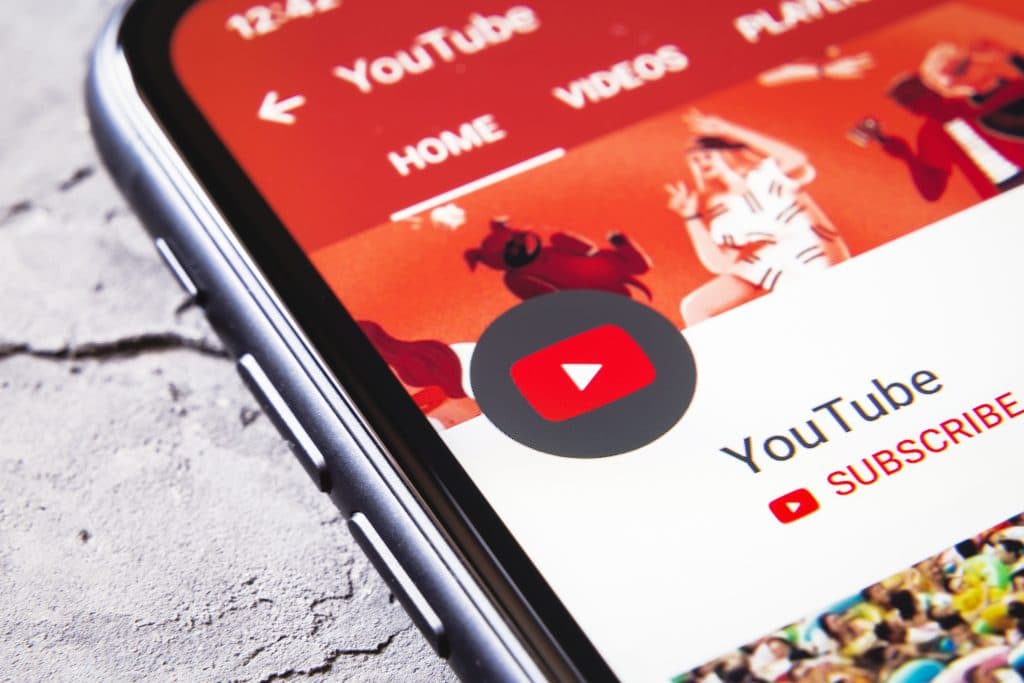
Or maybe it’s Facebook, where they’re watching this and they start following me, or they’re going to go to my website and sign up. And so, when people say yes to you by clicking a little bell and subscribing to you, if you’re on YouTube, every time I produce a new video, they’re going to get notification of it, and then they continue to engage with my content. But the important thing is, obviously, you’ve got to find ways to monetize these things.
For example, there are ads shown in my videos, there are ads shown on my website articles. I have paperback books to sell, I have digital books to sell, I have audio books to sell, I have hardcover books to sell. I also do coaching, I have products, I have mugs, I have T-shirts. I also encourage people to make donations by going to my website and clicking the donate button on the toolbar at the bottom of the page on any page of my website, and a certain percentage of people that hear that message are actually going to go and do that.
And that’s why I say the same thing, why there’s always the message “Free ebooks at UnderstandingRelationships.com.” Because these videos will get downloaded, they’ll get copied, they’ll get shared, they’ll get passed around, and that message is on every single video directing people to go to my website. Because, more than anything, I love subscribers. But what I really want is people’s email address. That enables me to have a relationship with my customer, the people that actually are most interested in what I have.
And if you’re a musician, it’s the same exact thing. You have to have an easy way to accumulate email addresses. And so, just like what you saw in the documentary with Gordon Lightfoot, the longer he played, as the days, and the weeks, and the months, and the years rolled by in his music career, he kept accumulating a bigger audience and ways to stay in contact with that audience.
Therefore, when you first start out, say you’re a band and today’s your first paid gig and you get two hundred bucks for that gig. And you go and you play that gig for an hour or two, or whatever it is, maybe three hours off and on through different sets. Maybe there’s other musicians that play in between. It may be you walk out of there with five or ten email addresses that night. That’s not a lot, but if you’re playing every week, one or two concerts every week or one or two venues every week, your email list grows. And so, what happens is, over time, and what you saw with Gordon Lightfoot, eventually, when he goes and plays at a venue, the venues are packed.

They start out as being smaller venues, and then when he’s able to fill the smaller venues, the bigger venues hear about it and they say, “Wow, everybody likes this guy’s music. Let me get him to play here, because all of his fans, will come to my venue and buy my food and my drinks.” And then they would go to Gordon Lightfoot and say, “I’ll pay you double what that small venue is playing if you come play at my venue.” And now, he’s got a raise because he’s raised his value proposition. So, when Gordon Lightfoot goes and plays the bigger venue, his audience comes with him, his customers come with him, and they spend money at the venue.
And over time, as he did that over several years, the audience got bigger and bigger and bigger. He continued writing songs, because he was a songwriter, and he continued to get better at it, because repetition is the mother of skill. And other successful musicians heard about him and really liked his music. Bob Dylan became a big fan of Gordon Lightfoot’s music, and they later became great lifelong friends because of that. So, him focusing on his passion and doing it over and over, playing at different venues, accumulating an audience and nowadays with email lists and social media, you’re able to start a relationship with your customer that can last a lifetime.
When you start out on day one, you’ve got no audience. When you’ve been doing it for ten years, you’ll probably have thousands of people on your email list. And when you say, “Hey, I’m going to go play at Bob’s Diner,” or whatever venue it happens to be, then you show up, and all your fans show up, and they spend a lot of money at that place, you’re very valuable to that venue. Because just paying you a few hundred bucks or a few thousand bucks or whatever it happens to be, if you bring in the people that come and spend lots of money, you earn more money yourself. You have t-shirts, you have mugs, you have a website, you have ads on your website, you have music videos, you have interview videos.
And this particular guy, which we’ll get into it in a second, he loves to read, so maybe he can tell interesting stories. Maybe he also writes interesting articles about the books and things that he reads. So, in addition to be being a musician, he’s a well-read human being, and he has intelligent things to say, or he writes about intelligent things or things that he’s passionate about on his website. The point being is that your audience will be interested to learn about you, to consume your products. In this case, it’s music.

In this case, a musician can make money on YouTube ads, Facebook ads, website ads, merchandise. You can sell CDs. You have digital downloads of your book. But today in the music business, where the real big money is made is when they go out on tour. And going out on tour, again, if you have a lot of people that know about your music and love your music, you can go to different venues and sell those venues out. And that’s how you make a lot of money.
So, you’ve got to think of yourself, even though you’re in the ‘music’ business, really, what you are is you’re just like a television station or a newspaper. You earn your viewers and your readers one person at a time, but you have to have a way to contact them. That’s why, if you’re a musician, the most important thing you have to do is get as many email addresses as possible, every time you play, from people that really enjoy your music. Most people probably aren’t going to like it enough or care enough to want to give you an email address. That’s okay. You just want to get the email addresses of the people that do, because the people that do like your music, like attracts like. People who like the same things tend to like each other. People that like your music will probably have friends that will also like your music. And so, through the magic of referrals, they will bring their friends and family.
Over time, over many years, your audience will grow, and then you have power and you have leverage, and you can pick and choose the venues you want to play at. And so, that’s how you raise your value proposition as a musician; your audience, you’re growing your reserve of knowledge, how you run your business, how you run your band, how you monetize what you do. Over time, if you do it properly, then you’re going to grow a great business.
If you’re a musician that is terrible at that, and you don’t have an email list, you could be playing for ten years and still not really have much of a following, because people that do like you never have a way to stay in touch, and they don’t know where you are or where you’re playing, and eventually they lose touch with you. And that’s a problem, because most people just suck at business. They don’t know what to do to monetize their passions. And again, all this stuff is laid out in “Mastering Yourself,” and you can read it for free. All you’ve got to do is subscribe to the email newsletter, and you can read all my books just by putting your name and your email in.
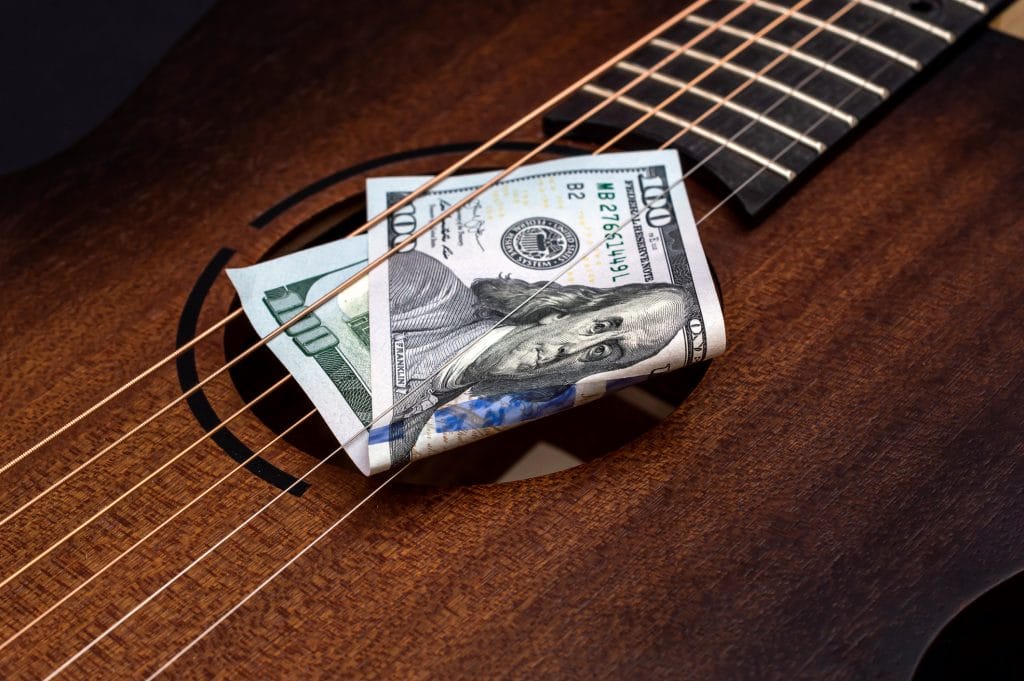
I know you always say a man should be on his purpose, but I did that throughout my 20’s and it didn’t pan out like I hoped it would, and now I feel behind in life.
Well, he doesn’t really say what he wants to do now, or maybe he’s still into music. But the point being is that if you played for ten years and you still have no email list, I wouldn’t say that the music was the problem or that you were the problem. It was that your strategy sucked. You simply didn’t do anything to build a way to stay in contact with your audience, which should always be growing. If you’re continuing to play, it’s just like these videos. My videos are like my advertisement for what I do. It encourages a small percentage of the people that really are passionate about what they’re hearing and seeing to go to my website and give me their email address, because they want to stay in contact with the latest information and latest videos that I put out.
It doesn’t matter whether you’re an attorney, or a musician, or you’re in the construction industry, you always want to have a good email list that adds value to people’s lives – good information on your product or service that people would like to continue consuming.
I have discovered a new passion and purpose in life, but I’m afraid to pursue it because it’s another creative outlet.
I would say you should keep working in the trades, doing what you’re doing, because you’re doing great at it. And whatever this new creative outlet is, you’ve got to do it on the side. Maybe you’re getting into art, I don’t know what it is that you’re doing, because you didn’t say, but the same principles apply. You’ve got to build an email list, so people can consume whatever the hell it is that you’re selling, or you’re making, or you’re creating.
You could be on a newspaper, maybe you’re in the news business, same thing. You have to build your viewership and your readership, and you earn every single one of those people, one person at a time. Because, like I said, if you talk to most musicians, “Hey, do you have an email list?” “Uhh, no.” You’re going to get around that. That’s why most of them never really go anywhere. They never really think from a business perspective, “What am I in the business of?”

I’m wondering if I should, instead, dedicate my time to something I am less passionate about, but has more potential to increase my income.
Well, like I said, you’ve already got a good job. Keep doing that. If you work in the trades, you’re probably working a set number of hours a week. When you work for somebody else, you know what you’re getting. You continue to invest for your future retirement, while you build your side hustle on the side. Again, this is all laid out in “Mastering Yourself.”
I know I’m not an idiot, but I’ve always hated school. I’m not sure if I can do college.
Well, the only reason you go to college is because it’s going to give you a degree that’s going to enable you to get a job that’s going to pay you a lot more money than you would make or be able to make without that college degree. And just going to college to get a degree that’s not going to increase your income earning potential is an absolute fucking waste of your money, and a lot of kids are doing that. They go to college, they get $100,000 in debt for some bullshit degree, and then they end up waiting tables. Which you can wait tables. You don’t need a fucking degree for that. And then on top of that, you’ve got debt you can’t get out from underneath of, because you can’t cancel student debt, even through bankruptcies. It literally makes you into a debt serf or a debt slave.
I have the fear, Coach. I am afraid to pursue my passion and purpose in life, because I did it once and I feel like it set me back.
Like I said, you just had a shitty strategy. I mean, I’m assuming you played and became a pretty good musician, but again, if you didn’t have a sound business strategy… I mean, you look at a band like Coldplay. Everybody knows who Coldplay is, and they have millions and millions of fans all over the world that have consumed their music. And they also have a giant fucking email list. And so, if you’re subscribed to their email list, you’re going to get emails that say, “Hey, we’re playing these cities” or “playing these dates.” And then a percentage of those people on the email list will go, “Oh, that’s my city!” and they’ll buy a ticket.

But the thing with Coldplay is he’s a great songwriter. And the same thing with Gordon Lightfoot, he was great, but it took many years to get great. Repetition is the mother of skill. And you know, what’s interesting is when you look at a comedian, like Joe Rogan, because everybody kind of knows who Joe Rogan is. What a comedian does is they write their bits, they write their show, they write all their jokes, and they get up in front of an audience and they perform it and they record it. And then they go back, and the good ones, they go back and they listen to it. “Oh, well, that joke just didn’t land.” So, they try to change the words and try to change the joke around a little bit.
And then the next time they perform, they do that bit with a new line in it, and that one gets a laugh, whereas the first one didn’t. And they keep doing that and refining their approach, and they do that comedy bit routine enough times to where they’re getting steady laughing and steady applause throughout it. And then they go and film their Netflix special and everyone goes, “Wow, you’re so amazing!”
All they did was practice telling their jokes to people. The ones that landed, they kept in, and the ones it didn’t, they changed, or they deleted it completely and put something else in. Repetition is the mother of skill, so they continue to refine their approach until they get enough consistent laughing throughout their performances that they were ready to film it and ready to sell it. And then people watch that and go, “Wow, that guy’s so funny. He’s so amazing!” But they don’t see all the work that went in to it.
You’ve got to study what the successful people are doing. When you were in the music business, how many musicians that were really successful did you really study and drill down on, what are they doing to make all the money that they’re making? What are they doing to be so successful? Did you go through those things? Because most people don’t. You want to model the success of other people. And like Tony Robbins says, “success leaves clues.”

I’ve seen countless documentaries on musicians that made it that struggled early, and they all pretty much did the same thing. And now, with technology being the way it is, you can just be an average decent musician. But if you really love it and you really have a passion for it, if you do it 10, 15, 20 years, by the time 20 years rolls around, you should be really good, you should have a really tight band, and you should have a very sizeable email list. So, when a venue asks you to play there, you’re able to negotiate your rate, because you’re going to bring a shit ton of customers.
Maybe you’re even able to work a percentage, where they pay you a percentage of the food and drink cut because of all the customers that you bring in. It’s the money that your customers are going to spend that really enables you, as a musician, to reach your full income earning potential. But if you’re just playing a bunch of venues for a couple of hundred bucks a night and not be building an email list, well, that’s just poor business.
And now it’s limiting my dating options.
Well, you are limiting your dating options, because you’re telling yourself that you don’t make enough money. But you’re making more money and you’re wealthier than most of the people in the world, dude. Whether you realize it or not, most people don’t have the ability. People in Africa would love to make $55,000 a year and be able to be saving 30% every month. And the same thing with most Americans. I think it’s like 60-70 % of most Americans don’t even have $1,000 in their bank account.
So, you’re already better than 70-75% of Americans. Plus, you’re in shape. So, you’re at the the top tier of successful men, whether you realize it or not. You’re beating yourself up unnecessarily, just because you didn’t employ a good strategy when you were a musician to grow your business.

I would like to find a good woman. I don’t care to play the field for the rest of my life, but I worry that even though I have a lot of great things going for me, I am missing the most important ingredient a lot of women are looking for, a high-status career with good income.
Well, that’s absolute bullshit. If you’ve read “How To Be A 3% Man” and you actually apply it, then you would know that what you just said is a bullshit statement. But this is your self-perception. This is what you’re telling yourself, “I’m not good enough.” So when you meet a woman, you’re worried, “Oh, what happens when she starts asking me about how much I earn or what I do for a living? Then she’s going to think I’m a loser and I don’t make enough money.” Well, you’re already way ahead of 75% of your competition anyway. And so, you’re beating yourself up completely unnecessarily, and you’re talking women out of liking you, who already like you, because you don’t think you’re very successful, when in reality, you’re successful – more successful than most people will ever be in life.
I’m not getting any younger, and the window for a family seems to be closing.
Well, men can pretty much have kids and almost until the day they die, as long as they’re healthy.
Part of me wants to wake up to a wife and kids every day, but the other half is terrified of spending the rest of my life in an office, buried with paperwork in front of a screen all day, like I see so many family men reduced to.
Yeah, I’m not interested in that bullshit, either.
Do I chase money in hopes it will open up my dating options?
No, you’re dating options will open up when you learn to love yourself and love your life. And you’re living awesome, you’re doing great. You’re doing what “How To Be A 3% Man” says. As far as your purpose and your mission, your strategy kind of sucks. I don’t think you’ve read “Mastering Yourself” yet. And on top of that, you’re ruining your chances, because you’re talking women out of liking you, because you’ve already decided ahead of time that you’re a failure. And so, when women start talking to you, you give off the vibe of, “I’m a loser. You shouldn’t want me.” And eventually they go, “Hey, you’re right.”
Or do I pursue my creative passions, knowing it will most likely make me less desirable as a long-term partner/father material for a lot of women?
Your friend,
Bob

What a fucked up way of looking at yourself. People will act consistently with how they view themselves to be, whether the view is accurate or not. And I’m telling you, you’re already way ahead of most Americans and especially people around the world, and you’re beating yourself up and shooting yourself in the foot. You’re a winner and you don’t even realize you’re a winner, because you’re telling yourself and convincing yourself that you’re a loser. And it’s fucking nonsense.
The reason that you’re not having success with women is because you haven’t learned to love and accept yourself and where you’re at. You should be excited about the journey. And whatever these creative passions are, you should pursue them. But like I talk about “Mastering Yourself,” you’ve got to ask yourself, who are the most successful people in that field? Who are the people that have done the best job of successfully monetizing those creative pursuits? What do they do? How do they advertise? How do they get their customers?
Again, it’s going to be similar to what I laid out in “Mastering Yourself.” All the things are there. You must build an audience. You must build a way to continually stay in contact with your customers. It doesn’t mean you barrage them with an email every day. Maybe it’s just once a week you send out a list of where you’re going to be, or your new products, or your new articles, or your videos, or whatever kind of content that you’re going to produce. You’ve got to model the success of other people and find out what they did successfully to get to where they are.
The roadmap that I lay out “Mastering Yourself” has everything you need. It doesn’t matter what industry you go into, the principles are all the same. It teaches you the fundamentals of the science of high achievement. It’s all laid out for you.
And if you’re still still struggling with that, and you’re still unsure of what to do and you like to get my help, go to UnderstandingRelationships.com, click the Products tab at the top of your screen and book a coaching session with yours truly.
Get the Book “How To Be A 3% Man”
*Amazon and the Amazon logo are trademarks of Amazon.com, Inc. or its affiliates. As an Amazon Associate I earn from qualifying purchases. **Free with a new Audible.com membership
*Amazon and the Amazon logo are trademarks of Amazon.com, Inc. or its affiliates. As an Amazon Associate I earn from qualifying purchases.
How to Be a 3% Man
Paperback | $29.99
How to Be a 3% Man
Hardcover | $49.99
How to Be a 3% Man
Paperback | $29.99
How to Be a 3% Man
Hardcover | $49.99
*Amazon and the Amazon logo are trademarks of Amazon.com, Inc. or its affiliates. As an Amazon Associate I earn from qualifying purchases.
Get the Book “Mastering Yourself”
*Amazon and the Amazon logo are trademarks of Amazon.com, Inc. or its affiliates. As an Amazon Associate I earn from qualifying purchases. **Free with a new Audible.com membership
*Amazon and the Amazon logo are trademarks of Amazon.com, Inc. or its affiliates. As an Amazon Associate I earn from qualifying purchases.
Mastering Yourself
Paperback | $49.99
Mastering Yourself
Hardcover | $99.99
Mastering Yourself
Paperback | $49.99
Mastering Yourself
Hardcover | $99.99
*Amazon and the Amazon logo are trademarks of Amazon.com, Inc. or its affiliates. As an Amazon Associate I earn from qualifying purchases.
Get the Book “Quotes, Ruminations & Contemplations”
*Amazon and the Amazon logo are trademarks of Amazon.com, Inc. or its affiliates. As an Amazon Associate I earn from qualifying purchases. **Free with a new Audible.com membership
*Amazon and the Amazon logo are trademarks of Amazon.com, Inc. or its affiliates. As an Amazon Associate I earn from qualifying purchases.
Quotes, Ruminations & Contemplations
Paperback | $49.99
Quotes, Ruminations & Contemplations
Hardcover | $99.99
*Amazon and the Amazon logo are trademarks of Amazon.com, Inc. or its affiliates. As an Amazon Associate I earn from qualifying purchases.
If you have a question you would like me to consider answering in a future Video Coaching Newsletter, you can send it (3-4 paragraphs/500 words max) to this email address: [email protected]
If you feel I have added value to your life, you can show your appreciation by doing one of the following three things:
- Make a donation to my work by clicking here to donate via PayPal anytime you feel I have added significant value to your life. You tip your favorite bartender, right? How about a buck... $2... $3... $5... $10... $20... what ever YOU feel its worth, every time you feel I have given you a good tip, new knowledge or helpful insight. Please feel free to donate any amount you think is equal to the value you received from my eBook & Home Study Course (audio lessons), articles, videos, emails, newsletters, etc.
- Referring your friends and family to this website so they can start learning and improving their dating and relationship life, happiness, balance and overall success in every area of their lives too!
- Purchase a phone/Zoom (audio only) coaching session for yourself or a friend by clicking here. Download the Amazon.com Kindle version of my book to your Kindle, Smartphone, Mac or PC for only $9.99 by clicking here. Get the iBook version for $9.99 from the iBookstore by clicking here. Get the Audio Book for FREE $0.00 with an Audible.com membership by clicking here or buy it for $19.95 at Amazon.com by clicking here. Get the iTunes Audio Book for $19.95 by clicking here. That way, you'll always have it with you to reference when you need it most. Thank you for reading this message!
From my heart to yours,

Corey Wayne
Author, Speaker, Peak Performance Coach, Entrepreneur
“Following your passion is pointless unless you are going to study the most successful people in your chosen career or life’s work to model what they are doing so successfully to monetize what they do for a living. Working hard doesn’t guarantee success in life. We get paid for the value that we bring to the marketplace. Our value is determined by growing our reserve of knowledge and developing our gifts, skills and talents to the best of our ability.” ~ Coach Corey Wayne
Click Anywhere on Today’s Instagram Image Below & You’ll Be Taken To My Instagram Page. When you get to my Instagram page, click the “Follow” Button so you can follow me on Instagram. I upload several new Instagram photos per week.
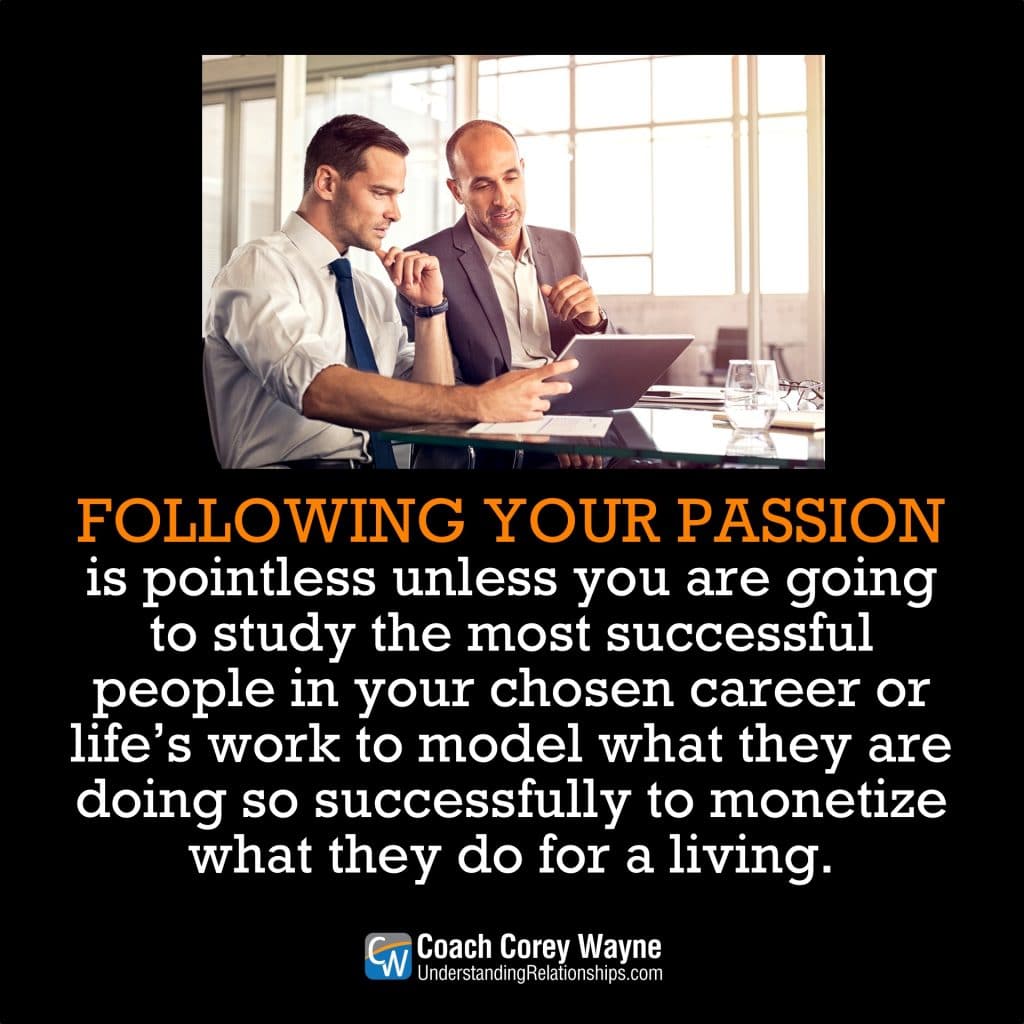



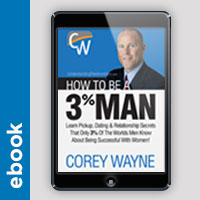





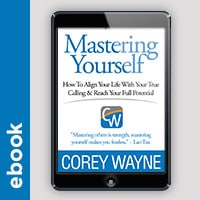
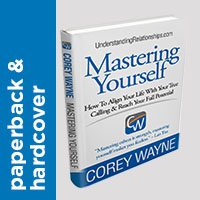

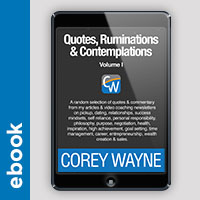
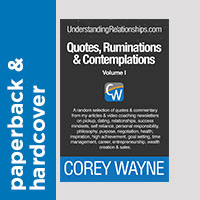
Leave A Reply